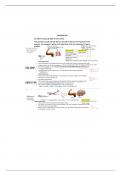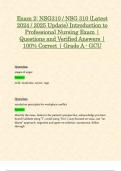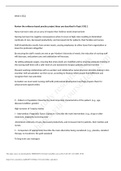ELECTROLYTES
Use table in Lewis, pg 1629, to learn norms.
Test questions usually ask labs that are way off or they are not important to the
question. For example, K will be a 2.0 rather than a 3.4 in the question if it was a
problem.
MG rich foods Mg poor foods
Peanut butter Alcohol intake
Green leafy veggies
Mg- 1.3-2.1 chocolate
Maalox, Milk of Mg,
Mg citrate
Hypermagnesemia
• occurs mostly with renal impairment and too much intake. May come from diet (see list), meds,
pregnant women for the txt of eclampsia.
• S/S include hypotension, facial flushing, lethargy, nausea/vomiting, causes everything to relax
including the diaphragm.
• Avoid Mg intake, Fluids and diuretics if no renal impairment, IV Calcium Gluconate
Hypomagnesemia
• Occurs in pts with limited Mg intake or increased GI or renal losses. May occur d/t fasting,
starvation or excessive alcohol use.
• Resembles hypocalcemia
• S/S include muscle cramps, hyperactive deep tendon reflexes leading to excitability with a
positive Chvosteks and Trousseau’s sign. Similar to Hypopcalcemia
• Diet and oral supplements, IV Sliding Scale orders in the hospital.
Phos- 3.0—4.5
Phos rich foods
Hyperphosphatemia Dairy Products
• Occurs mostly with renal impairment and kidney failure.
• S/S usually occur when Ca is also affected leading to the same symptoms of Hypocalcemia since
they are on an inverse relationship
• Identify and treat underlying cause. Restrict dairy, give phosphate binding drugs, hemodialysis,
loop diuretics, correct Ca levels
, Hypophosphatemia
• Occurs from decreased absorption (malabsorption, diarrhea, and phosphate binding antacids),
increased urinary excretion, or from ECF to ICF shifts. May occur in parenteral replacement.
• S/S may include impaired cellular energy and 02 delivery to tissues. Mild cases often are
asymptomatic but severe may cause CNS depression, respiratory failure, and death.
• Decrease dietary intake or supplements, IV administration of sodium phosphate or potassium
phosphate.
K rich foods
Bananas
Dried fruit
K- 3.5-5.0
Avacados
Monitor ECG w/ K!
Potatoes
Hyperkalemia
• May result from renal impairment, shift from ICF to ECF, crushing injuries, burns, severe
infections.
• S/S include cardiac dysrhythmias, fatigue, confusion, tetany, muscle cramps, paresthesias, and
weakness, loss of muscle tone leading to respiratory arrest.
• Decrease dietary intake and supplements, loop and thiazide diuretics, dialysis, Kayexelate (check
bowel sounds first), IV insulin when hyperglycemia occurs with hyperkalemia, IV Calcium
chloride or calcium gluconate.
Hypokalemia
• Causes may be due to increased losses, increased shift, rarely from diet intake. Most common
are form kidney losses or GI tract losses. May be the result of diarrhea, vomiting, nasogastric
suctioning, laxative use, ileostomy drainage.
• S/S include cardiac dysrhythmias and impaired muscle function, paresthesias, , paralysis to
extremeties and severe cases respiratory drive, to the diaphragm, decreased GI motility, glucose
intolerance and hyperglycemia.
• Diet for mild issues, Oral and IV K replacement per sliding scale (always administer via a pump,
NEVER via IV push),
Ca- 9.0-10.5
Hypercalcemia






